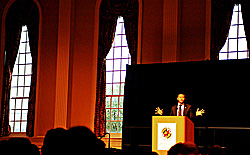
Dan Choi speaks about being kicked out of the military because of the don’t ask, don’t tell policy.
When West Point graduate and Iraq war veteran Lt. Daniel Choi came out as a gay soldier, he said he was upholding the military honor code and his responsibility to the nation.
Last night, Choi, who received his discharge papers from the military after revealing his sexuality on national television, told students in Stamp Student Union his coming-out story and advocated for the repeal of the “don’t ask, don’t tell” policy.
“Before we learned anything at West Point, we learned the honor code,” Choi said. “That a cadet will not lie.”
A federal policy known as “don’t ask, don’t tell,” forces gay men and women in the military to lie about their sexual orientation or face dishonorable discharge. Under President Barack Obama’s administration alone, 600 men and women in the military have been dismissed for their sexual orientations, Choi said.
While some students unabashedly proclaimed their support, others were weary about taking a side in such a politically charged debate.
Self-professed “military brat” and senior philosophy major Kevin Carr said traveling the world with his family made him question the legitimacy of “don’t ask, don’t tell.”
“The policy is an embarrassment to the United States,” Carr said. “If other countries can have gays in the military, why can’t we?”
However, a junior biology major who came to learn more about Choi’s experience said she came from a military family and planned to join the Air Force but was afraid to disclose her opinions on the controversial policy, for fear of repercussions.
Choi stands to lose his career and benefits as a result of coming out as gay. He said the real threat of “don’t ask, don’t tell” is the one it poses to families.
“You won’t know if your partner has died. … They won’t contact you,” Choi said. “Every night [you] don’t get a phone call — and there’s not time to call every night — you have to assume he or she is dead. That rips apart a family.”
Choi served in the military for a decade, staying in the closet until he met his first boyfriend at age 27.
“I never understood those things people talked about in movies: I didn’t understand those poems, I didn’t get what Beyoncé or whoever was singing about,” he said. “Not until I met my boyfriend.”
Unable to hide his happiness and feeling compelled to tell the truth about who he was, Choi came out to his conservative Korean parents and then eventually to close friends in the service. His fellow soldiers, he said, were initially more accepting than his parents.
“I told my mother, ‘I’m not going to marry a Korean girl.’ And she said, ‘No, don’t marry white girl!'” he recalled, drawing laughs from the audience.
Choi not only focused on his experience with his family, but also drew a parallel between democracy and identity, beginning his speech by reciting, in Arabic, verses by the famous poet al-Mutanabbi.
“The horses, and the night, and the sand — they all know who I am,” Choi said, the impassioned, lilting Arabic shocking the audience into silence.
The soldier went on to say he spoke those very words to a Shia man in Iraq. Choi told him that democracy would bring freedom for his people to divulge their identities without persecution, a liberty the ethnic group had been denied for centuries.
“We talk about civil rights, inalienable rights, human rights, all kids of rights,” Choi said to the more than 100 students gathered in the Grand Ballroom. “It’s not my right to come out, it’s my responsibility to come out and protect those rights.”
The end of Choi’s speech drew a standing ovation and questions from the audience had to be cut off due to time constraints.
apino at umdbk dot com



